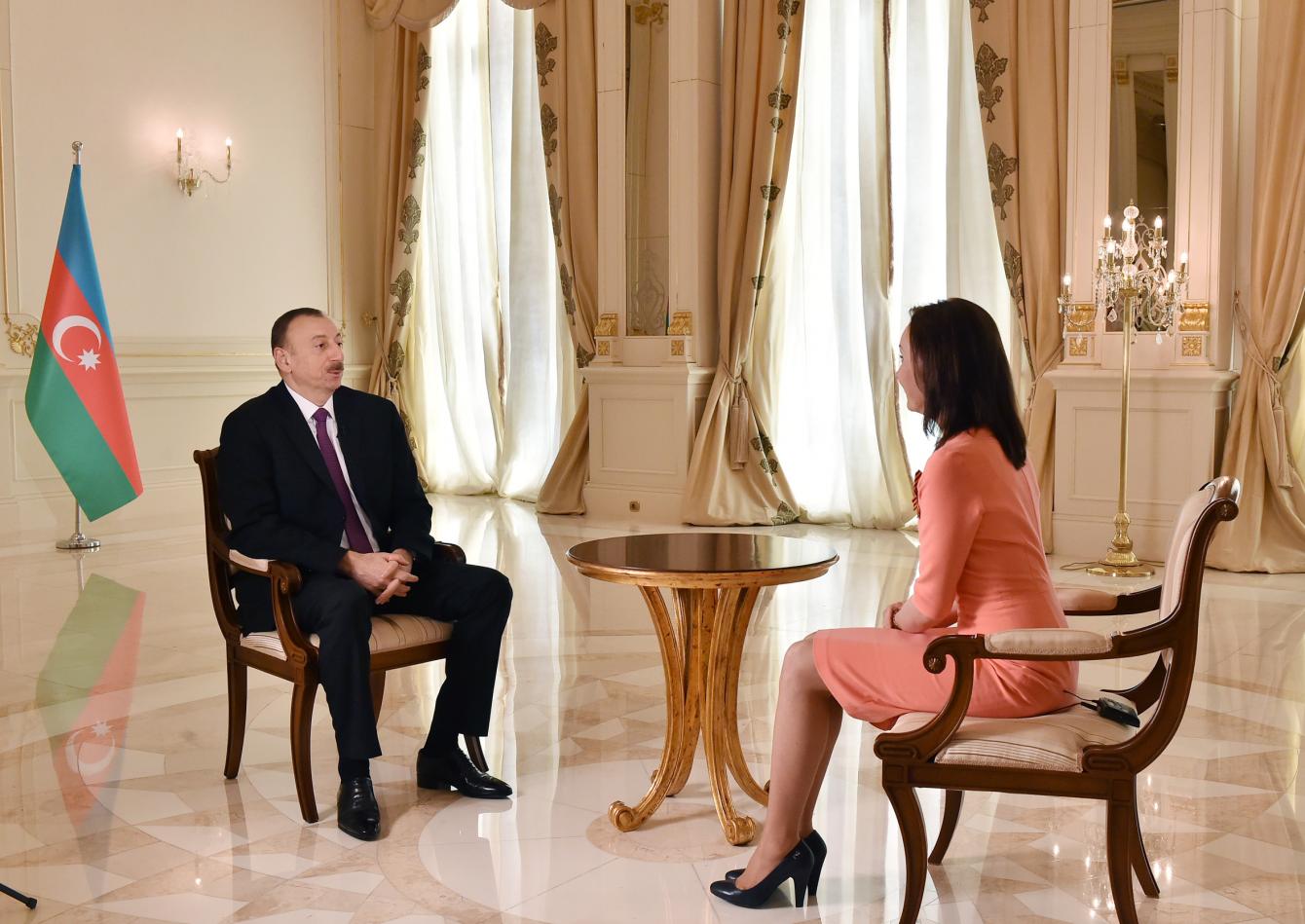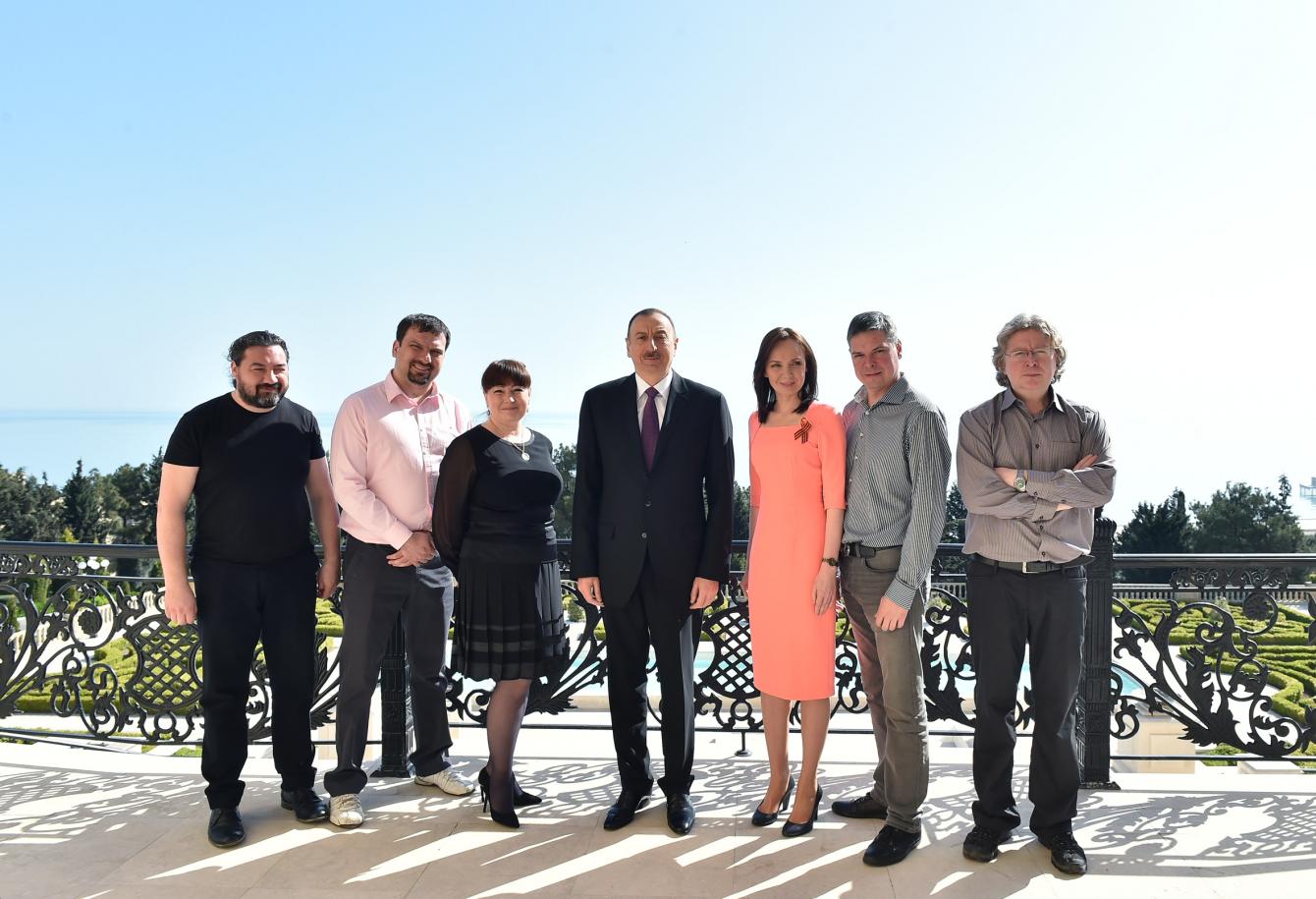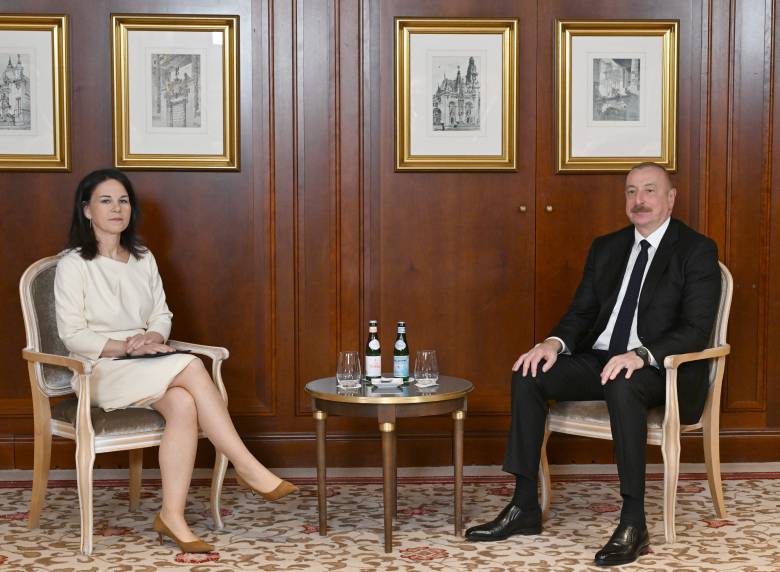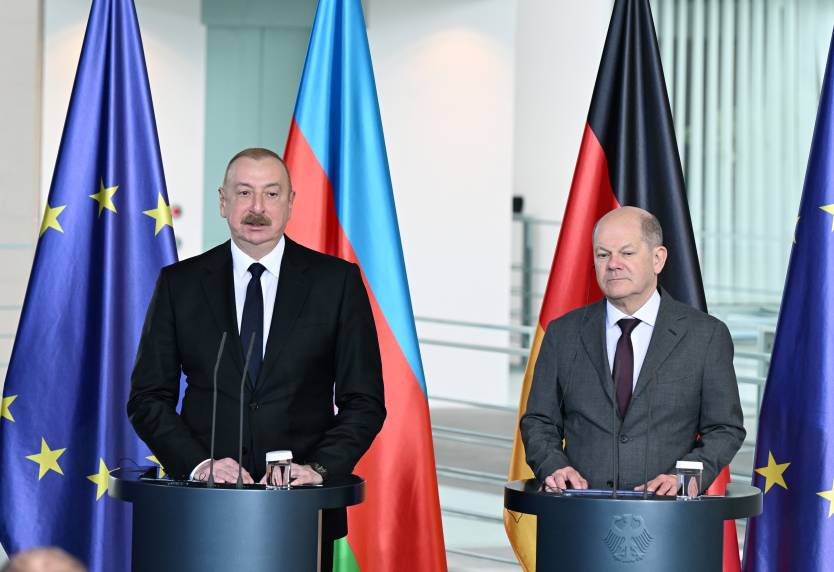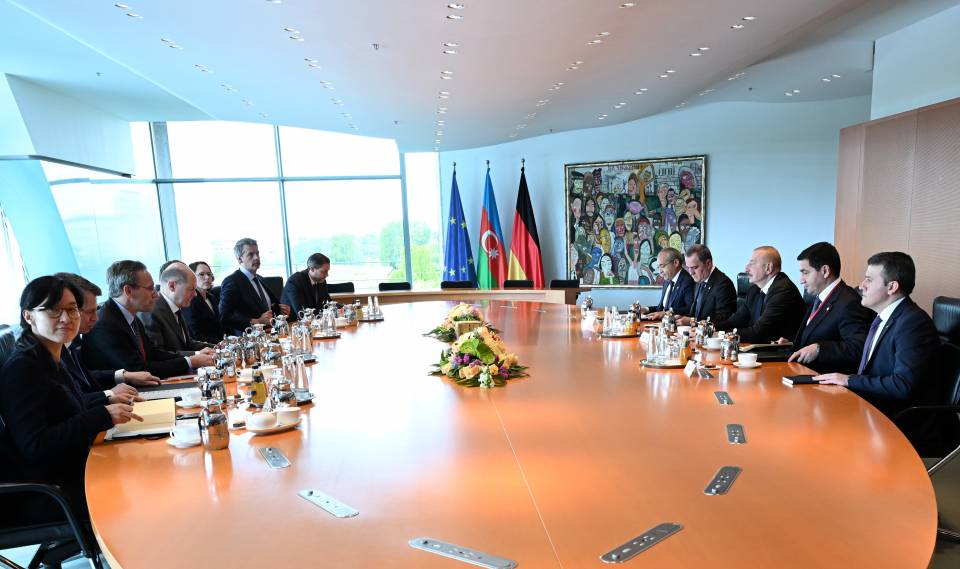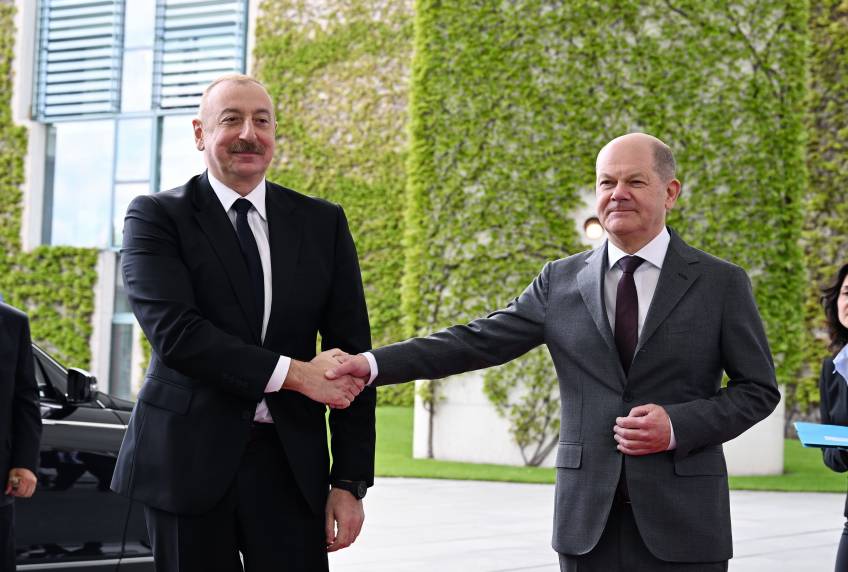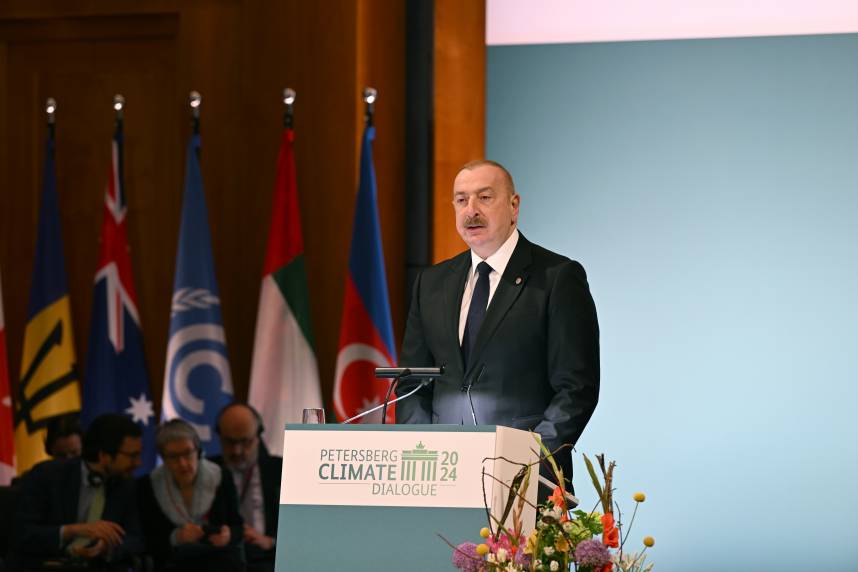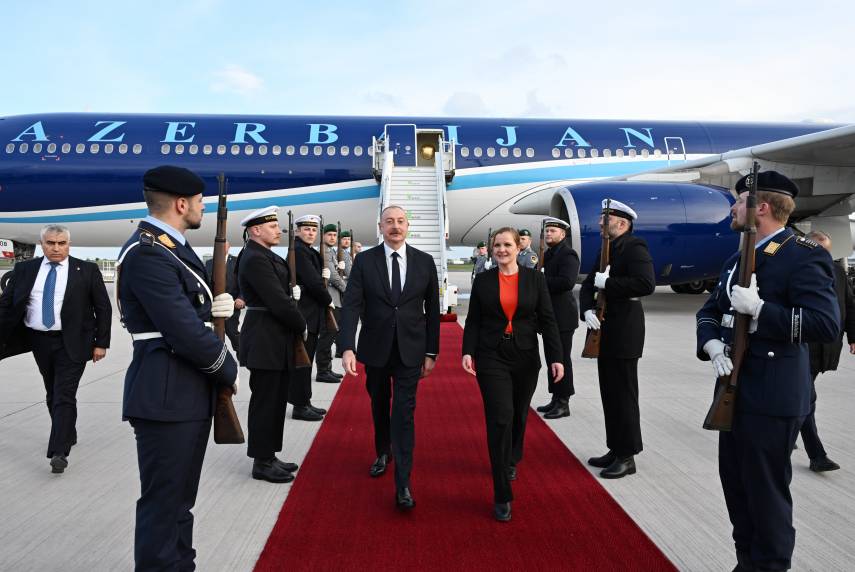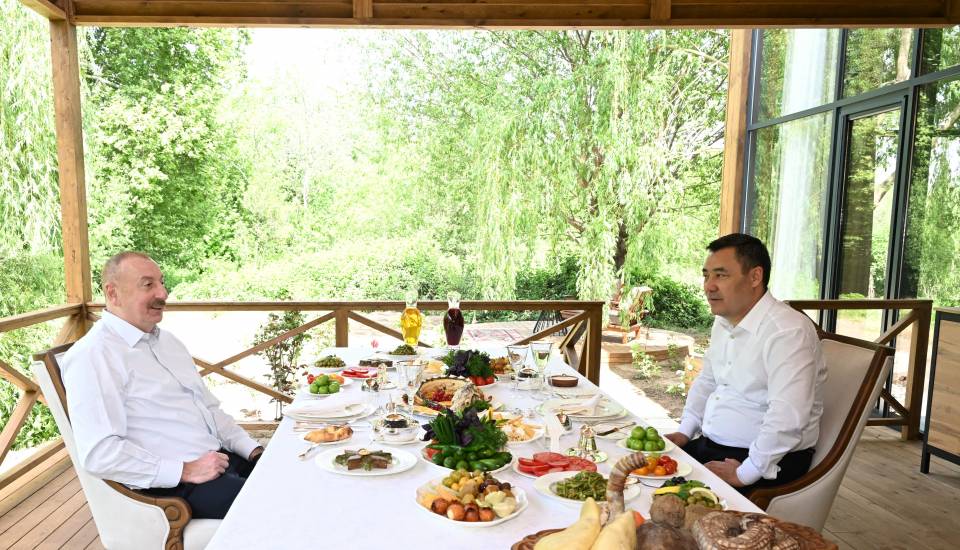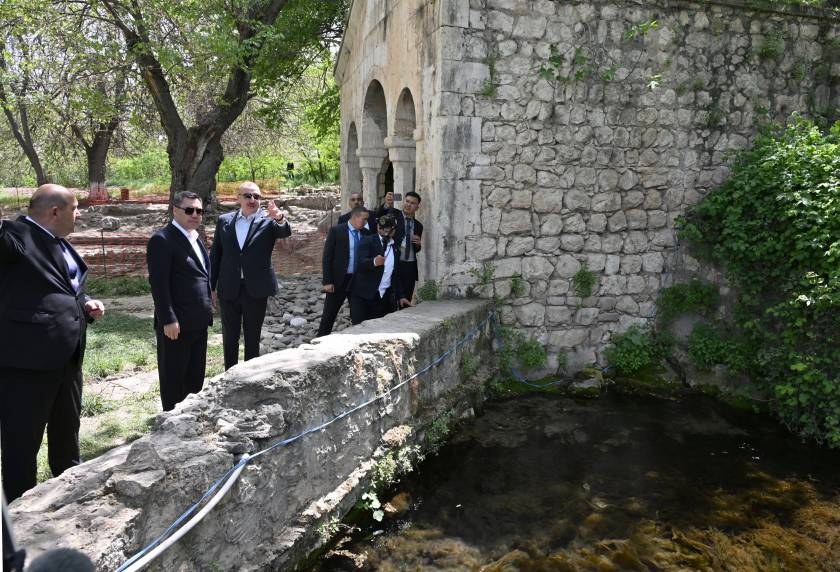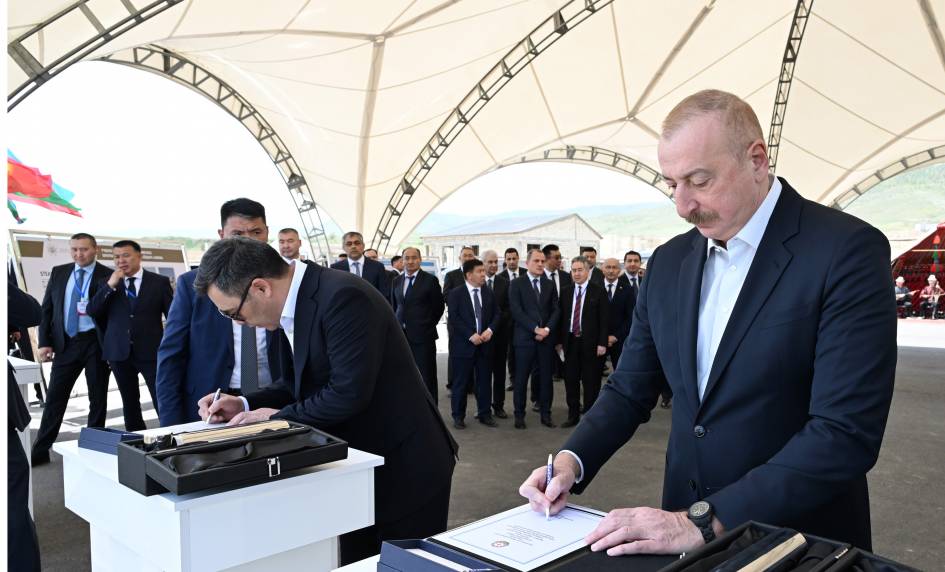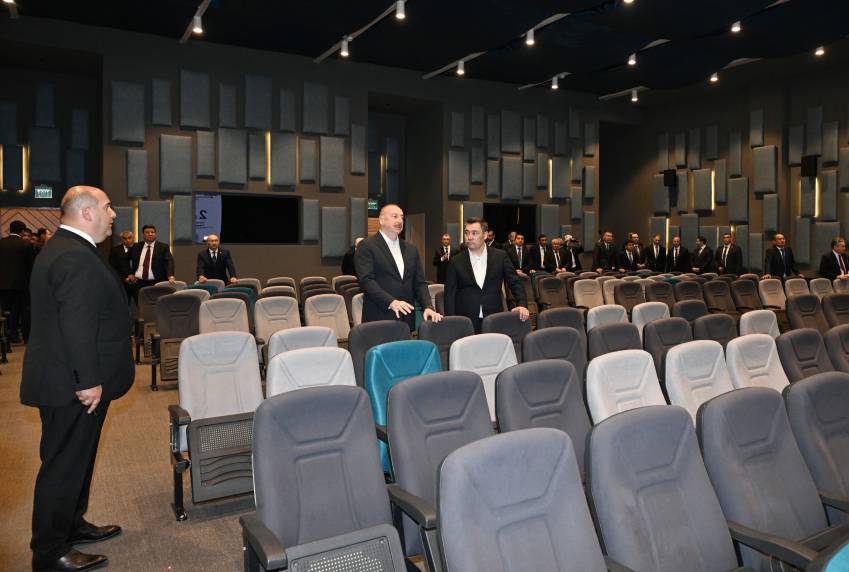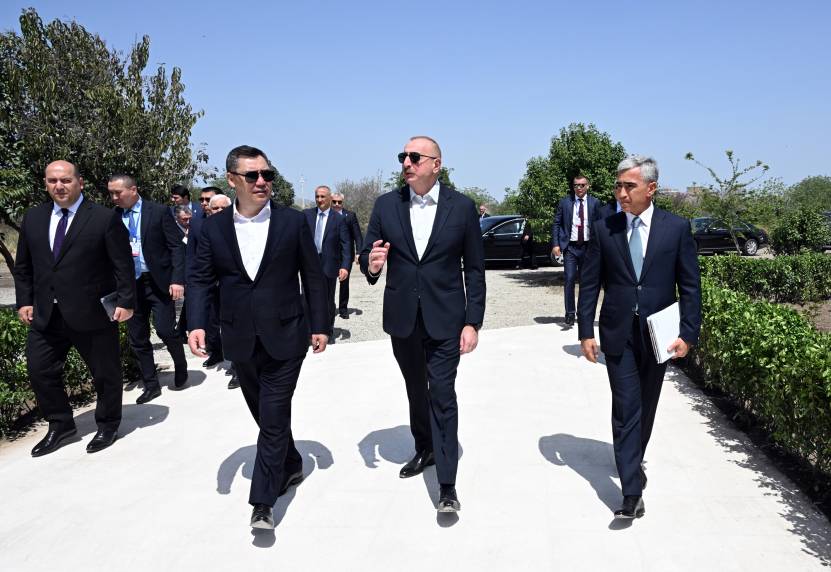17:14
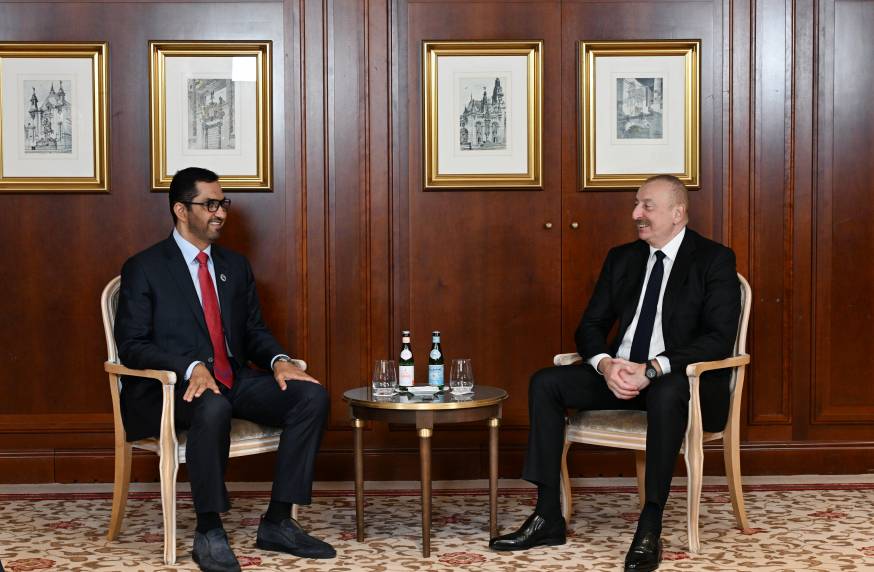
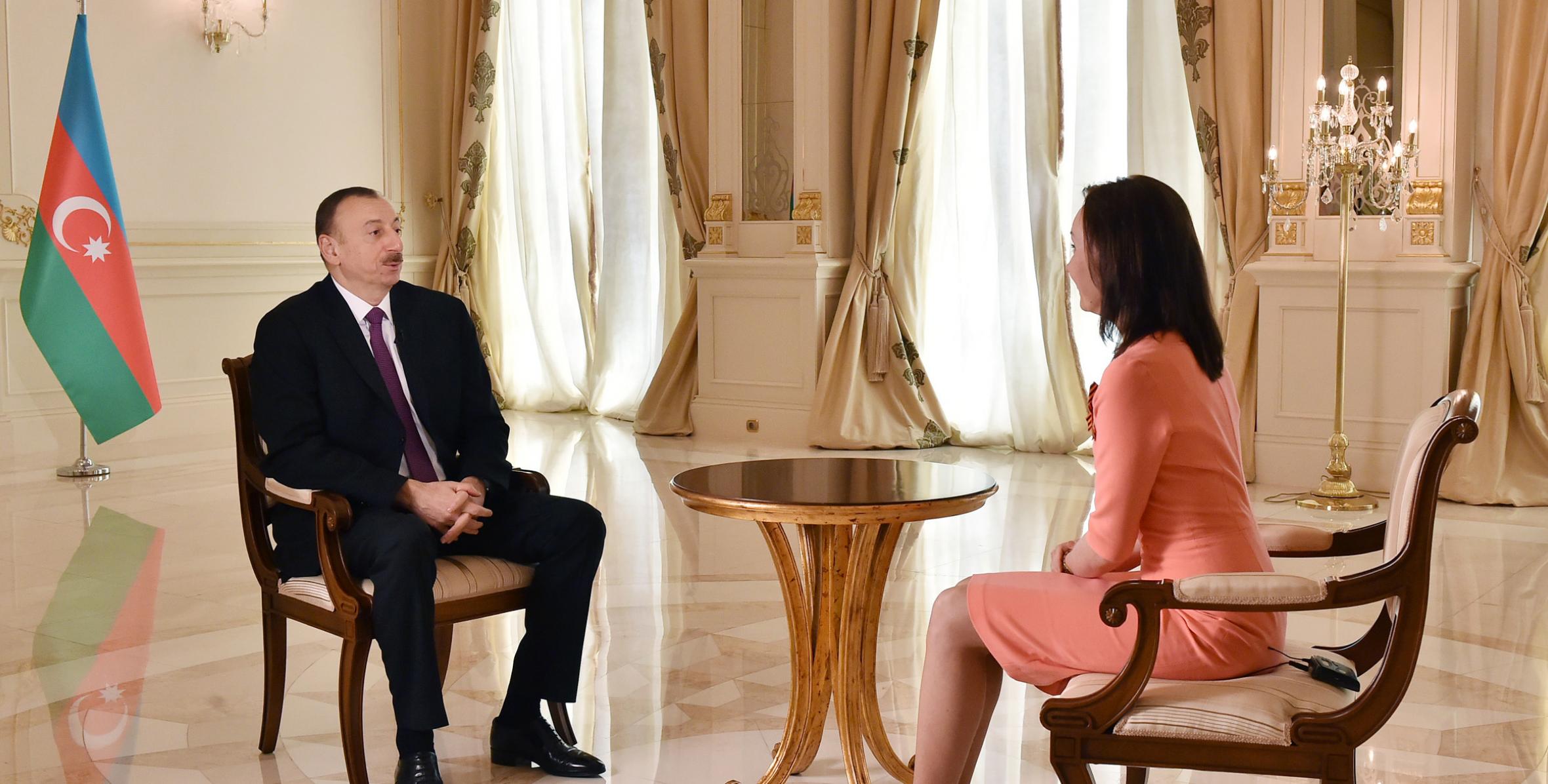
President of the Republic of Azerbaijan Ilham Aliyev has been interviewed by “Russia-24” channel.
- Mr. President, good afternoon! Thank you very much again for receiving us here today. We are meeting on the eve of Victory Day, the 70th anniversary of Victory in the Great Patriotic War, which is perhaps the main event that unites our peoples, the event of our common history. What does Victory Day mean to Azerbaijan and to you personally?
- It is a great holiday for us which we celebrate officially for a few days – both before Victory Day and during it. This includes meetings with veterans and various celebrations held in Azerbaijan.
This holiday is very dear to us. It is an official public holiday. Unfortunately, in the early years of independence, the then authorities of Azerbaijan eliminated this holiday. It was only revitalized with the ascent of President Heydar Aliyev to power in 1993, when Victory Day was declared a public holiday. It is a day off now. Thus historical justice has been restored. We have a very good attitude to our veterans. I must say that this year we will complete the program on the provision of all our veterans with cars. We also regularly allocate apartments, areas for recreation and cash rewards to them. They are the pride of our people, and we honor the memory of those killed. And we are convinced that the young generation should be brought up on the example of the selfless heroism and love of the homeland, so that the tradition of heroism and love of the Fatherland continues. Also, as you have pointed out, this is a historic moment that brings all nations of the former Soviet Union together. In principle, it should bring together all those who contributed to the victory over fascism.
We are proud of the fact that 700,000 representatives of Azerbaijan took part in the war, more than 300,000 were killed and 123 people were awarded the title of Hero of the Soviet Union. So we have something to be proud of. We cherish the memory of our common Victory.
- I would like to say what you once said off the record. I will say this publicly. You said that the memory of the Great Patriotic War for you is as sacred as the memory of your father. Just as we cherish the memory of our ancestors and family members, it is important to cherish the memories of this historic event, of this historical tragedy. But how should this be done when attempts are being made everywhere to rewrite history, and this vaccine of war doesn’t work for many any longer?
- We are very concerned about these attempts – first, to rewrite history and belittle the role of the Soviet army in the victory over fascism, as well as the attempts we are seeing in terms of the glorification of Nazi criminals, their followers and those who share their ideology. It probably seemed to us all some time ago that fascism was completely over with and that this evil mankind had not seen in its history is gone forever. Unfortunately, after some time, as a result of the efforts of certain circles and a propaganda campaign, we can see that a part of the younger generation around the world does not know the actual history. Constantly inculcated with distorted historical facts, they somewhat become susceptible to this virus. We see marches, torch processions and demonstrations of neo-fascists in many regions around the world. All this is of great concern.
We cherish our history and the heroism of all the peoples of the Soviet Union and other allied countries which put an end to this nightmare. It must live in the memory of generations. So I think that it is now the responsibility of politicians, the leaders of countries and influential public figures who revere the great feat of our fathers and grandfathers. They should always talk about this in their work. It seemed to us for some time that everyone knew this history, that there are so many historical documents that there could not be two opinions in this respect. But it turns out that this is not the case. The saddest thing is that the younger generation, those who are 20-25 years old now, essentially discredit our common victory by joining fascist marches. And if this trend grows further in the future, then at some point history will be turned upside down. I think that at this stage all public entities sharing the convictions I am talking about should coordinate their actions, should work hard in terms of informing the public, especially the younger people, about the historical truth and counter the glorification of fascism and the rewriting of history.
- Do you remain confident that after a few decades the situation will not fundamentally change for the worse?
- A huge responsibility lies on politicians, statesmen, public figures, writers and intellectuals due to the fact that we should always keep this topic in the spotlight. I want to say again, perhaps in repetition and because I am sincerely worried about this, that I personally thought 10-15 years ago that there could be no two opinions on this matter. But you see, things have changed. The countries that suffered huge human losses and Nazi occupation have themselves become somewhat manipulated and exposed to psychological attacks and pressure. These are all very worrying trends. This is a shame not only in terms of distortion of historical justice, these are also worrying trends for the future of the world. It suggests that this ideology is unfortunately still alive. It poses a great danger to us all.
- Will you be in Moscow on 9 May?
- Yes, of course I will. I was in Moscow for the previous anniversary. I usually spend 9 May in Baku. I meet with veterans and we celebrate together. But this year I will meet with them earlier. And on 9 May I will be in Moscow.
- You said that the Great Patriotic War and Victory Day bring all the peoples of the former USSR together. Do the Armenian and Azerbaijani peoples get any closer on this day?
- It is difficult to tell. With regard to the relations between our peoples, I am sure that, as opposed to our Armenian counterparts, we cannot be enemies forever. We lived in one state and fought against fascism together. Therefore, I think that there will come an understanding to the Armenian leadership that it is necessary to put an end to hostility and stop the occupation. The main obstacle in the way of normalization of relations between our countries is the ongoing occupation of Azerbaijani territory by Armenia. It has no justification – be it historical, legal or political. It is known that the highest international body, the UN Security Council, has adopted four resolutions demanding an immediate and unconditional withdrawal of Armenian occupying forces from Azerbaijani territory. More than 20 years have passed, but these resolutions are still on paper. In other words, international law is grossly violated, the rights of more than a million people have been flagrantly violated, as they were evicted from their land. By the way, there were a lot of veterans among them.
It is no secret and we are concerned about the fact that although the Armenian people have also suffered from fascism and many representatives of the Armenian people honorably fought in the Great Patriotic War, there are trends in Armenia today we find it very difficult to understand. There is glorification of the Nazis, those who served Hitler. Their names are known.
The Azerbaijani public, including our veterans, have recently sent letters to the heads of friendly states, including the Russian president, expressing their concern over the fact that streets, houses and squares in Armenia are being named after those who fought on the side of Hitler. This is very worrying indeed. I think that the sense of nationalism should not prevail over the sense of justice. Therefore, at this stage, if there were an opportunity for Armenian and Azerbaijani veterans to meet, they would probably get together at a friendly table and recall those glorious pages of our common history. But unfortunately, the Armenian side prevents any contacts between our peoples in every possible way. Attempts to organize meetings of the public and MPs were made several years ago. We even thought of expanding this format. But as soon as the people in Armenia saw that it could lead to a rapprochement and some friendly feelings, they were immediately discontinued. The main problem is that the occupation continues, and unfortunately Armenia wants to delay this process as long as it can. But they have to understand that it can’t last forever. There will be an end to it. And the sooner the better.
- However, the Armenian President will also be in Moscow. Can any contacts take place between you?
- We are not scheduled to meet in this period. We had meetings last year. In the summer, a meeting was brokered by the Russian president in Sochi, then by US Secretary of State Kerry in the fall and then by French President Hollande. It seemed to us that we could move forward, but then, just less than two weeks after the meeting in Paris during which we agreed to reduce tensions on the line of fire, Armenia organized a large-scale exercise in the occupied Agdam District involving, according to their own data, 47,000 troops. There was no need for that. It was an obvious provocation aimed at disrupting the negotiation process. We exercised restraint for a few days. We ordered not to respond to that because we thought that we have to reduce tensions. But the enemy attempted to attack our positions using combat helicopters Mi-24, and as a result of a retaliation on our part one of the helicopters was destroyed. This gave the Armenian side the opportunity to accuse Azerbaijan of provocation. Therefore, we have had no contacts since November when this happened. It was not us who carried out military exercises on the territory of Armenia. It was them who staged exercises on the territory of our Agdam District. Therefore, this convinced us once again that all attempts of the Armenian side are aimed at maintaining the status quo. The co-chair countries of the OSCE Minsk Group
– Russia, France and the United States – have repeatedly stated that the status quo was unacceptable and must be changed. What does this mean? It means that a process of de-occupation must begin. But the Armenian side does not want to accept this and is therefore trying to hamper the negotiation process in every possible way. So there has been no contact between us since November of last year up until now, the end of April, and we can’t say when there will be any.
- The rewriting of history has become a fairly sensitive tool in a wide arsenal of pressure techniques on Russia and its allies. Another way is economic sanctions Russia has been living under for more than a year. This also affects neighboring countries. Russia is overcoming the consequences of this crisis. Does Azerbaijan feel that?
- I must say that this situation does not have a major impact on our economy. The cash transfers from the Azerbaijanis living and working in Russia have reduced to some extent. As you know, there are a lot of them there. Most of them are rather well-to-do, they work in business and, of course, very much in the tradition of our people, all relatives always help each other. Those who have the ability help those who don’t. So we are seeing a reduction of the financial assistance from the Azerbaijanis living in Russia. But since this accounts for a small portion of our domestic product, there is no major impact on the economy.
But in general, the standard of living in Azerbaijan is growing. The economy in the three months of this year has risen by 5.3 per cent, while the most important indicator we always highlight, the non-oil economy, by 7 per cent. So despite the drop in the oil price and, of course, the situation with sanctions in Russia – after all, Russia is one of our main trading partners – the diversified economy and the reforms carried out have enabled us to develop dynamically. As for the sanctions, our position has always been unequivocal. We have always expressed it and it is no secret. We are against this form of international communication. As you probably know, when the situation was discussed at the Parliamentary Assembly of the Council of Europe (PACE), the entire Azerbaijani delegation opposed the sanctions against Russia, which I think set an example to those who claim every now and then to be allies of the Russian Federation, but when it comes to demonstrating a position at PACE, they preferred to back out. This is another indicator. I think that the Russian public should know that. This is when a position should be manifested. This is when a friendly shoulder is necessary. When all things are good, of course, everyone can say nice words and sing praises, but when you have to show your position not in Moscow, behind the scenes, but in Strasbourg, this is where dignity, position and, in general, human qualities are manifested. So I want to say once again that we are against such forms of pressure, as they are counterproductive. We are always in favor of dialogue for the resolution of all complex issues at the negotiating table and in an atmosphere of trust. Of course, trust between Russia and the West has to a certain degree been lost, but I think that it is necessary to make effort to restore it. There are many dangers in the world – both in our region and in Europe. These include extremism, radicalism, terrorism, the resurgence of fascism we are seeing in Europe. These issues should be addressed collectively.
- Azerbaijan relies on gas production. It is logical and natural in a situation when you have such resources. But there are attempts to politicize this story too. Today Azerbaijan is associated with great hopes over the Southern Gas Corridor project.
Some people are trying to present it as an alternative or some sort of a counterweight to Russian gas projects in Europe. Tell us about the scale of planned gas supplies and the expected markets for this gas.
- To be honest, we are also concerned about this trend and this information background. However, if you look at the official statements of high-level officials, there are usually no such assessments there. This is all being done in the so-called expert background, amongst political scientists and influential circles that simply create such a backdrop. And this obtrusive propaganda is already being perceived by some as a reality. On our side, not a single official representative has made such statements. Neither have we ever viewed this project as some kind of an alternative. The energy policy of Azerbaijan has been carried out for 21 years, since 1994, when we started work on the development of the largest oil fields in our country.
At that time we built several oil pipelines to transport our oil to global markets. After all, we do not have access to the world ocean. Gas reserves were uncovered in the late 1990s. And then we started to work hard in order to extract the gas. We have been producing it in certain quantities since 2007 and we export gas to our neighbors in small quantities: to Turkey, Georgia, Iran and even Russia. We have very large reserves, so, of course, we need to market them. The Southern Gas Corridor project was planned long ago. You probably know that it was called "Nabucco" before.
- It is now called “Nabucco 2.0.”
- Indeed, but again, this is the way it is referred to by the people I have just spoken about. We realized that the "Nabucco" project is not viable, namely because there was no political will, financial resources, coordination and consolidation of efforts. It seemed to us that some people simply wanted to provide for themselves at our expense. And the role of Azerbaijan in the project simply boiled down to being a supplier of raw materials, which was completely against our interests.
So the project was essentially dropped from the agenda. But we still had to sell our reserves. And, of course, the major natural gas markets for us are Turkey and Europe, because our other neighbors Iran and Russia have a wealth of natural resources themselves, while the Georgian market is quite small. Therefore, we initiated the Southern Gas Corridor project and entered into an agreement with Turkey in 2012 on the construction of TANAP – the Trans Anadolu gas pipeline which is part of the Southern Gas Corridor. Its implementation has already started. We are carrying out design work. Construction will begin shortly. At the first stage, Azerbaijani gas will be delivered to the Turkish market in even greater volumes than now, and then it will flow through Turkey to Europe. This project will allow us the opportunity to sell our large gas reserves. I can’t say that it will bring momentary profit because the costs are very large and it will be necessary to reimburse them. Besides, gas revenues are not comparable to the profit from the oil. After all, the main source of currency for us is the export of oil, which has now stabilized and will be continued for a long time. Of course, the gas factor will strengthen our economy. Of course, it will greatly enhance Azerbaijan's role and importance for consumers. Every country wants its role and importance to grow. Thus, we will expand our capabilities.
The Southern Gas Corridor project is about the development of the Shah Deniz-2 field. This project envisages to produce and sell 16 billion cubic meters of gas in addition to the 8 billion we are selling today. Of these, 6 billion will be sent to Turkey and 10 billion to several European countries. Of course, this is not comparable to the volumes Europe receives from Norway, Algeria or Russia.
- I suggest finishing with a topic we usually end our meetings with. It is something that brings people together not only in the post-Soviet area, but also in the whole world. I mean sport and the European Games Azerbaijan is about to host very soon.
The flame of the European Games has already been lit.
- Yes, of course, we hope that this event will be a festival for athletes from all over Europe. It has been a huge responsibility for us. I must say that Azerbaijan was the only candidate for hosting the Games. And if we hadn’t agreed to doing it, then perhaps the idea would have remained just an idea. I should point out the exceptional role of President of the European Olympic Committee Mr. Patrick Hickey, who has always promoted this idea. It has been a tremendous responsibility for us, but, of course, it has been a great honor as well. We had just two and a half years, in fact even less, to conduct the Game comparable to the Olympics. They will bring together more than 6,000 athletes representing 20 sports. But we have coped with the task and the flame has already been lit. We lit in the ancient temple of Atashgah. It is an ancient temple of Zoroastrianism. Azerbaijan, as you know, is a land of many religions: Zoroastrianism, Islam, Christianity, Judaism. There is an ambiance of brotherhood among peoples and inter-religious cooperation in our country. So the torch is already on a journey throughout our country. But you are probably familiar with this too. We are seeing increasing attempts to discredit the event – and the closer we get to the Games, the more pronounced they become. This is only causing surprise and bewilderment. What is this for? It seems as though someone can’t come to terms with the fact that Azerbaijan can host such Games. So now we are experiencing exactly what you experienced on the eve of Sochi – slander and lies. They are citing some completely astronomical figures which we have allegedly spent on operational needs. To conduct the Games we have only spent a few hundred million of dollars. Of the sports facilities we currently have, 90 per cent had already been built or were under construction before the decision was made. In other words, we were not building them for the Games. The transport infrastructure of Baku was developed even before. You visit us quite often, so you can confirm that. So this campaign of lies, hatred and anger is now upon us. But this is not important, the most important thing is that we, I am sure, will create a festival of friendship, a celebration of sport. And our main guests, of course, will be the athletes. We invite everyone who wants to participate in this festival. We want athletes, tourists, ordinary citizens of European countries and the CIS to feel at home, in a good atmosphere. I wish success to the Russian team. I think that Russia will be the main favorite of the Games.
- I think you will survive the information war, just as we have done and gone on to win the Olympics. We also wish you sport victories. Thank you.
